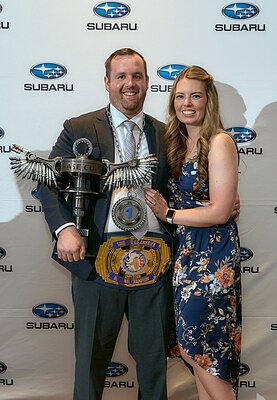
Investing in Tomorrow’s Mechanics: Subaru Addresses Technician Shortage with Training & Competition
As the automotive industry faces a critical technician shortage, Subaru is doubling down on training programs and competitive initiatives to build a skilled workforce and ensure quality service for customers.
Investing in Tomorrow’s Mechanics: Subaru Addresses Technician Shortage with Training & Competition
By Ruth Flores
DEARBORN, MI – The automotive industry is grappling with a growing crisis: a significant shortage of skilled technicians. As vehicles become increasingly complex, requiring specialized knowledge of electric systems, advanced diagnostics, and intricate repair procedures, the demand for qualified mechanics far outpaces the supply. Amidst this challenge, Subaru is taking proactive steps, investing heavily in technician training programs like Subaru-U and initiatives like its recent national technician competition, showcasing a commitment to both workforce development and maintaining high service standards.
Zach Gibbons, recently crowned Subaru’s top technician in the U.S., represents the culmination of this investment. The competition isn't just about recognizing skill; it’s a vital component in attracting and retaining talent in a field facing an aging workforce and a lack of new entrants.
“The industry is facing a real challenge finding qualified technicians,” said a Subaru executive. “We recognize that investing in training and creating opportunities for growth are essential to addressing this issue.”
The Growing Technician Gap
The U.S. Bureau of Labor Statistics projects approximately 70,000 annual openings for automotive service technicians and mechanics over the next decade. This demand is fueled by several factors, including an aging workforce, a lack of skilled trades education, and the increasing complexity of modern vehicles. TechForce Foundation reports a significant gap between the technicians needed and the number entering the field, highlighting the urgent need for increased investment in technical education.
“The rise of electric vehicles and advanced driver-assistance systems has dramatically increased the skill set required to repair and maintain vehicles,” explained an industry analyst. “Technicians now need to be proficient in areas like high-voltage electrical systems, computer diagnostics, and software programming.”
Subaru-U: A Model for Workforce Development
Subaru-U is a partnership between Subaru and various technical colleges and high schools across the country. The program provides students with hands-on training, online courses, and certification opportunities designed to prepare them for careers as Subaru technicians. The curriculum covers a wide range of topics, including engine repair, electrical systems, diagnostics, and customer service.
“Subaru-U is a comprehensive program that provides students with the skills and knowledge they need to succeed in the automotive industry,” said a representative from a participating technical college. “The program also provides students with valuable career opportunities at Subaru dealerships.”
The program boasts a strong track record of placing graduates into full-time positions at Subaru dealerships. Subaru emphasizes the importance of not just training technicians, but also creating a supportive environment that fosters their growth and development.
Beyond Training: The National Technician Competition
The recent national technician competition, which culminated in Gibbons’ victory, isn’t just a celebratory event. It's a critical platform for showcasing technical prowess, fostering a competitive spirit, and identifying top talent. The competition tests technicians on a wide range of skills, including diagnostic accuracy, repair efficiency, and problem-solving abilities.
“The competition is designed to be challenging and comprehensive,” said a Subaru technician involved in organizing the event. “It’s a great way to identify technicians who are truly passionate about their work and committed to excellence.”
Gibbons, a veteran Subaru technician, demonstrated exceptional skills throughout the competition. His victory underscored the importance of continuous learning and dedication to the craft. His peers and mentors describe him as a dedicated problem solver and a valuable asset to his team.
Benchmarking Against the Competition
Subaru isn't alone in recognizing the importance of technician training. Other automakers, such as Toyota, Honda, and Nissan, have also launched comprehensive training programs. Toyota's T-TEN program, Honda's PACT program, and Nissan's Technical Training Academy all aim to address the technician shortage and ensure a steady supply of skilled mechanics.
However, Subaru's holistic approach, combining a robust training program like Subaru-U with competitive initiatives like the national technician competition, sets it apart. The company's commitment to fostering a culture of continuous learning and providing opportunities for growth is attracting top talent and building a loyal workforce.
The Road Ahead
Addressing the automotive technician shortage will require a collaborative effort between automakers, educational institutions, and government agencies. Increased investment in technical education, apprenticeship programs, and workforce development initiatives are essential. Additionally, it’s crucial to attract younger generations to the skilled trades and challenge the perception that these careers are less desirable than traditional white-collar jobs.
Subaru's commitment to investing in its workforce and fostering a culture of continuous learning provides a model for other automakers to follow. By prioritizing technician training and creating opportunities for growth, Subaru is not only addressing the immediate technician shortage but also ensuring its long-term success in a rapidly evolving automotive landscape. The story of Zach Gibbons – and the many technicians coming through programs like Subaru-U – illustrates the value of skilled labor in a future increasingly reliant on complex vehicle technologies.
